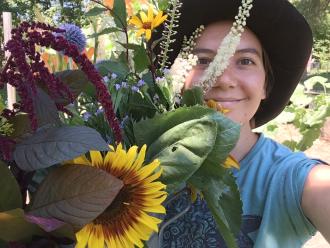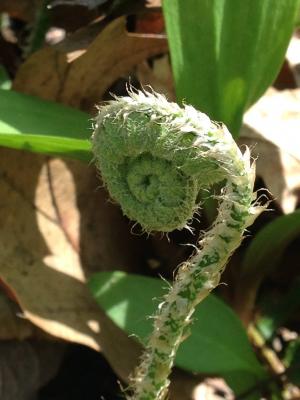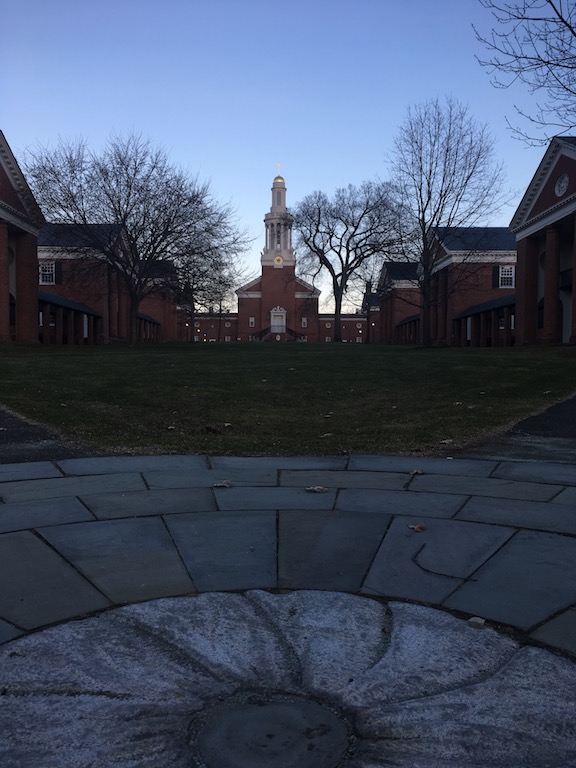Hello friends - meet Char White!
Char is a rising 2nd year MAR student and will be serving the YDS community as the Student Sustainability Coordinator for the coming academic year. Char is a key player in engaging students in YDS’ sustainability efforts. Read on to learn more about her and how YDS is embracing efforts to (re) forge our connections with Creation:
 Sustainability Efforts at YDS
Sustainability Efforts at YDS
By Char White
Sustainability Coordinator, 18-19
Compost is a holy work. As much as religious study is focused on creation, I feel that decomposition deserve as much attention. Did Lazarus not stink of death when he emerged from the tomb? Did living beings not re-form out of dry bones in the desert before Ezekiel’s eyes? Death is an oft-overlooked component to life, which nurtures and receives without discrimination. And death and life in symbiotic relationship is never further away than the compost bucket on our kitchen shelf.
When I arrived at YDS in the fall of 2017, I was happy to find compost bins in the spotlight at the Refectory. I come from a fiber farm in southern Vermont, where food waste has never been a sin—any leftovers go in the chicken bucket, or to feed Princess Peppermint, the pig. Anything edible never went into the garbage, but instead went on to nourish another life. In turn, the pig and the chickens fertilize the garden, where I will plant vegetables and dyestuffs the following year.
Though I am at YDS to pursue an MAR in the Hebrew Bible, tending the soils of the present world is one of my primary  focuses. This focus is both metaphorical and literal, and is a theme I find highly present at YDS. The compost in the Refectory—as well as students’ personal compost, and the compostable paper towels from the School’s bathrooms—eventually fertilizes the Divinity Garden and Yale Farm. This both decreases the School’s food waste and carbon footprint, and nourishes the local soil. This effort of composting, led by sustainability coordinator Julia Johnson, M.Div. ’18, reinforces the promise of stewardship at YDS. Caring for our planet begins with caring for our local ecosystems.
focuses. This focus is both metaphorical and literal, and is a theme I find highly present at YDS. The compost in the Refectory—as well as students’ personal compost, and the compostable paper towels from the School’s bathrooms—eventually fertilizes the Divinity Garden and Yale Farm. This both decreases the School’s food waste and carbon footprint, and nourishes the local soil. This effort of composting, led by sustainability coordinator Julia Johnson, M.Div. ’18, reinforces the promise of stewardship at YDS. Caring for our planet begins with caring for our local ecosystems.
 focuses. This focus is both metaphorical and literal, and is a theme I find highly present at YDS. The compost in the Refectory—as well as students’ personal compost, and the compostable paper towels from the School’s bathrooms—eventually fertilizes the Divinity Garden and Yale Farm. This both decreases the School’s food waste and carbon footprint, and nourishes the local soil. This effort of composting, led by sustainability coordinator Julia Johnson, M.Div. ’18, reinforces the promise of stewardship at YDS. Caring for our planet begins with caring for our local ecosystems.
focuses. This focus is both metaphorical and literal, and is a theme I find highly present at YDS. The compost in the Refectory—as well as students’ personal compost, and the compostable paper towels from the School’s bathrooms—eventually fertilizes the Divinity Garden and Yale Farm. This both decreases the School’s food waste and carbon footprint, and nourishes the local soil. This effort of composting, led by sustainability coordinator Julia Johnson, M.Div. ’18, reinforces the promise of stewardship at YDS. Caring for our planet begins with caring for our local ecosystems. But YDS’ long-term vision of stewardship does not begin and end with simply rejuvenating the soil and cutting down our food waste. In addition to replacing Marquand Chapel’s light bulbs with fluorescent lights and instating a Teracycle box in the Common Room, plans for a Living Village—a place for students to live which fosters community and benefits the environment—have been long in the works. This design envisions YDS as the location for a symbiotic relationship between humans and the environment to take place.
YDS Sustainability—as well as the larger workings of Yale Sustainability—is working to reduce, reuse, recycle, but also to build our sense of self and forge connections to the earth and each other. There is plenty to do in the year ahead; we plan on continuing our discussions and efforts surrounding food justice, composting, and fossil fuel usage. We plan on building a stronger relationship with farmers and ecological stewards in the New Haven area. We plan on continuing to foster love for the earth and each other through vibrant discussions and meaningful actions.
I love farming, and I love history. These two main loves stem from the same source: connection to the earth. Being a student of religious history has allowed me to see into our collective mind a little bit—the ways in which we human beings try to find our purposes on this blue and green rock hurtling through space. We confront pain and misunderstanding, senseless violence, and incredible loss through the surrealness of the written word, which has somehow survived the sands of time. We confront the greatest conundrum of all—death—by telling stories about us, a people formed from dirt. And by caring for the soil we come from (and will return to), we care for our collective and continuing history as a species.
